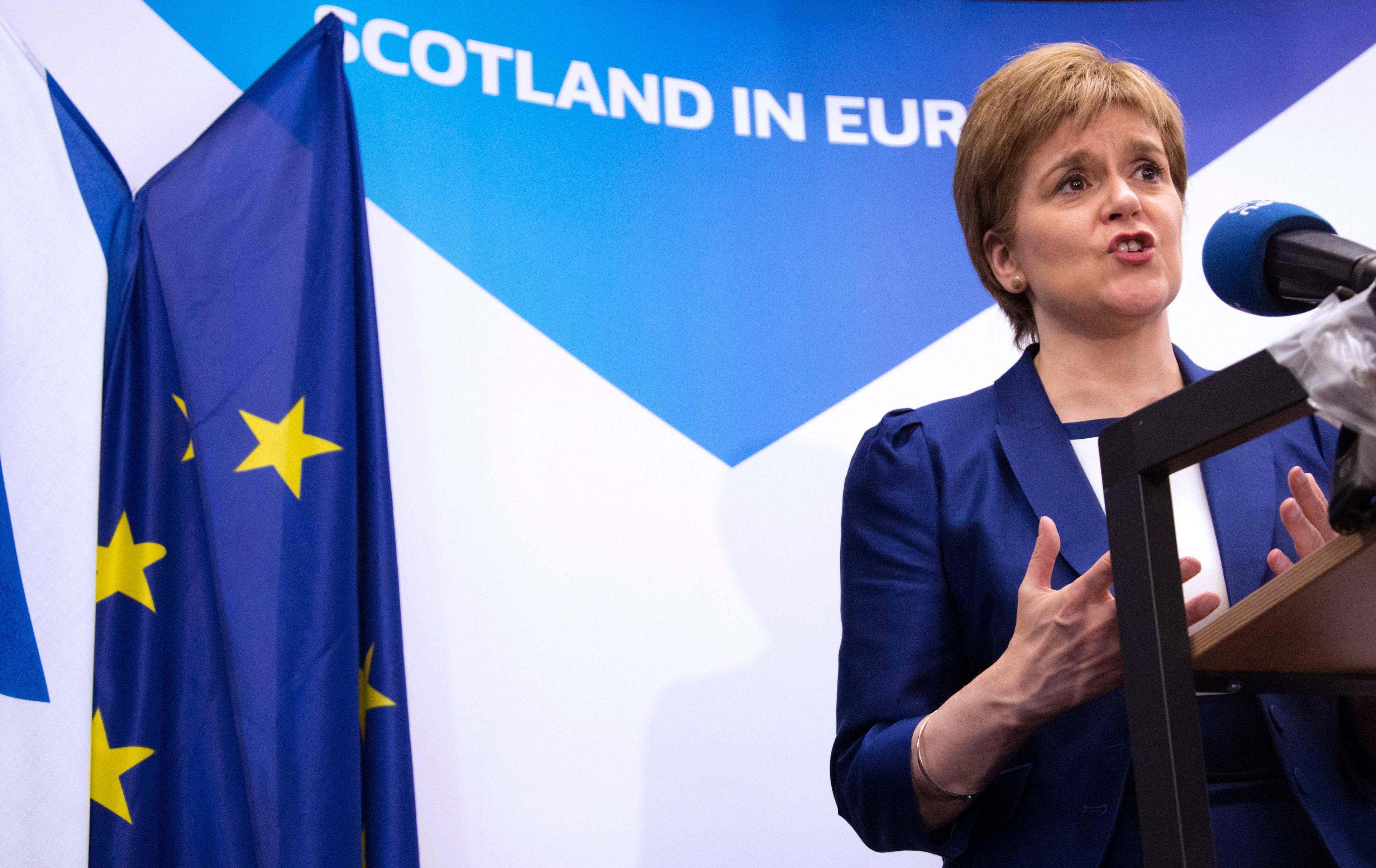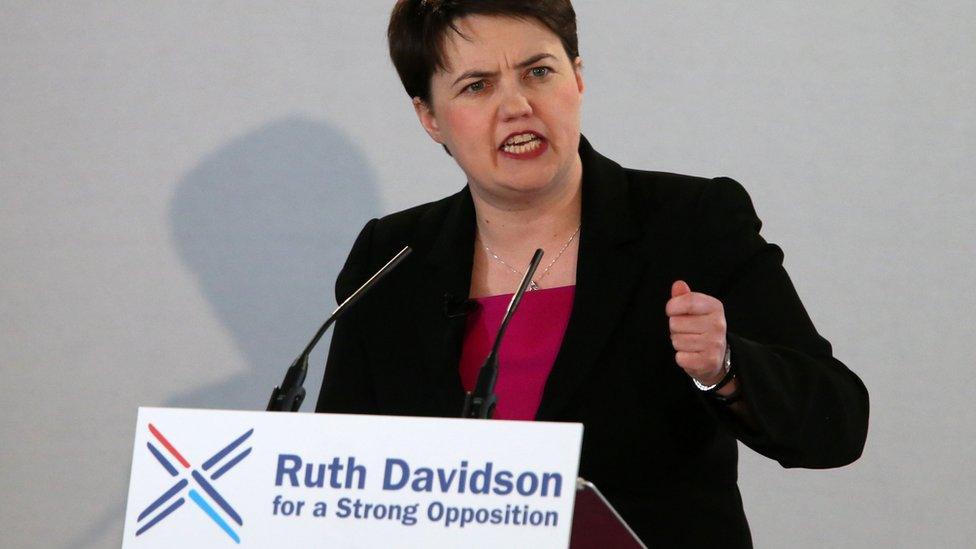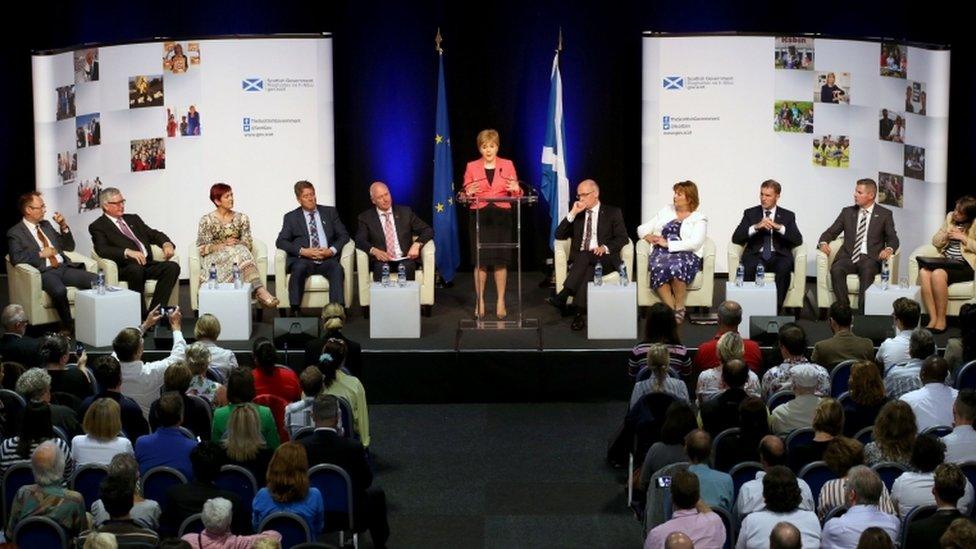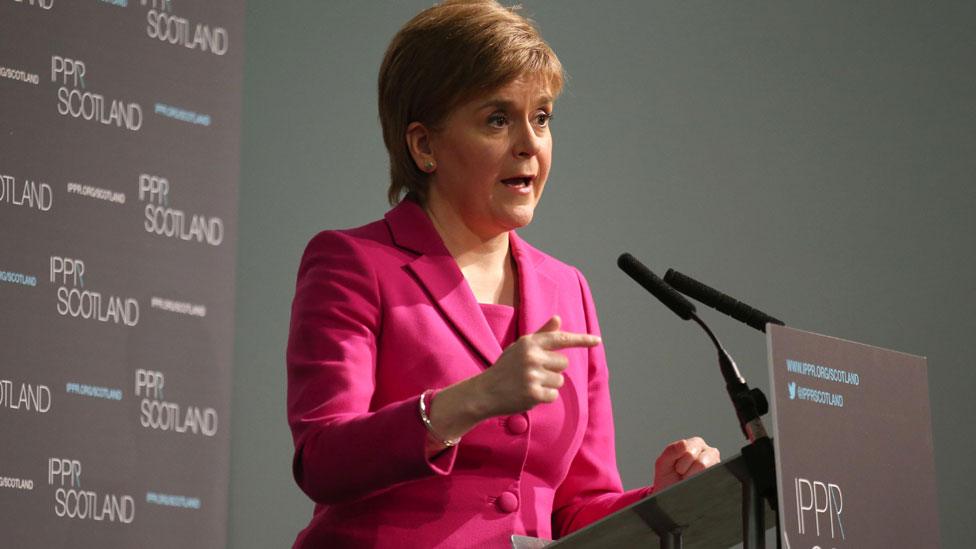First minister warns on cost of Brexit to Scotland
- Published

Nicola Sturgeon believes leaving the EU would cost the Scottish economy billions
The first minister has warned that leaving the EU could cost the Scottish economy billions of pounds.
Nicola Sturgeon published an analysis of possible Brexit consequences, saying the Scottish economy could lose between £1.7bn and £11.2bn a year by 2030.
Ms Sturgeon said this could have a severe impact on public spending.
Scottish Conservative leader Ruth Davidson urged the Scottish government to focus on stabilising the country in the wake of the Brexit vote.
She said it needed to focus on stability and "get back to the day job".
A spokesman for First Minister Nicola Sturgeon described Ms Davidson's comments as the "height of hypocrisy".
And he blamed the Conservatives for Brexit and the "huge economic damage" it could cause Scotland.
The UK as a whole voted to leave the European Union, but a majority (62%) of people living in Scotland voted to remain.
Ms Sturgeon said a second independence referendum was "highly likely" following the poll, but has promised to explore other options to safeguard Scotland's status in Europe.
Government analysis
Analysis published by the Scottish government suggested that by 2030, Scottish GDP was projected to be between £1.7bn and £11.2bn per year lower than it would have been if Brexit does not occur.
Tax revenue was projected to be between £1.7bn and £3.7bn lower.
Ms Sturgeon, who also announced a new Scottish government minister on Brexit to lobby UK government, said "This paper shows, in the starkest possible terms, the potentially huge cost to Scotland of being taken out of the European Union and the single market.
"This analysis - based on a wide range of sources - demonstrates that leaving the EU, under any potential alternative arrangement, will have a profound and long-lasting impact on the public finances and the wider economic and societal wellbeing of both Scotland and the UK as a whole.
"That stark picture outlined today means that, whatever the model of relationship with the EU which is chosen by the UK government in their negotiations before and after Article 50 is triggered, it will not be as economically beneficial as full EU membership."


Analysis by BBC Scotland Political Editor Brian Taylor
These figures are an arithmetical forecast, with caveats. They will be contested by those who argue that the UK/Scotland can thrive outside the EU. But they are also - indeed, primarily - a political tool.
Practical implications
Firstly, and most immediately, Nicola Sturgeon is seeking to some extent to pre-empt the publication on Wednesday of Government Expenditure and Revenue Scotland (GERS) figures.
Given that oil has continued to decline and that the economy generally is less than buoyant, the latest GERS verdict is unlikely to be rosy.
Secondly, and much more saliently, Ms Sturgeon is aiming an attack at the UK government and those who are currently pondering the practical implications of the Brexit vote.
She is saying that unless Brexit is accompanied by a soft landing, unless there is substantial mitigation, unless the terms can be made relatively favourable, the potential cost is huge. So today's paper is designed to contribute, sharply, to the Brexit preparation process.
However, there is a wider point. It is "simply unacceptable", Ms Sturgeon says, that "Scotland faces the prospect of being dragged out of the EU against its will".


Ruth Davidson will speak to activists in Edinburgh
Scottish Conservative leader Ruth Davidson accused Ms Sturgeon of using Brexit to deflect from the "underlying fragility" of Scotland's economy.
She said: "The first minister is in danger of losing the plot completely.
"Her own government's figures will show tomorrow that Scotland benefits from a multi-billion Union dividend.
"And yet, in order to revive her independence obsession, she is trying to pretend these facts don't exist."
Ms Davidson added: "Scotland benefits from being a member of the UK, and the UK benefits from our being there.
"It is time Nicola Sturgeon ended this charade, took her threat of a second independent referendum off the table, and got back to the day job of sorting out the mess her government has made of our public services."
Scottish Labour Leader Kezia Dugdale said: "Two months to the day since the EU referendum the SNP has finally highlighted the economic risks to Scotland of the UK leaving the EU. Serious questions need to be asked why this analysis was not produced well in advance of polling day."
"The first minister's decision to announce a minister for Brexit and a new sub-committee of ministers is welcome and follows Labour's calls for a specialist unit to be set up within the Scottish government itself."
- Published23 August 2016
- Published17 August 2016

- Published25 July 2016
